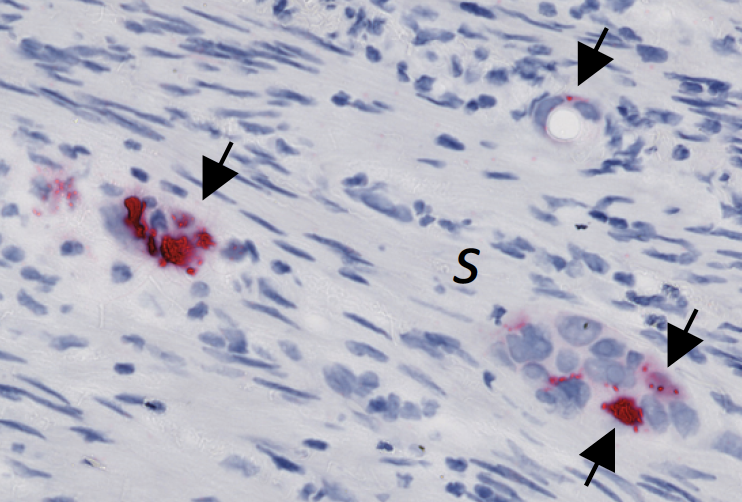ISH image. Fusobacterium nucleatum probe (red) within colorectal cancer tissue. Analysis by our collaborator Paolo Nuciforo, Vall d'Hebron Institute of Oncology.
Bullman, et al., Science, 2017. Analysis of Fusobacterium persistence and antibiotic response in colorectal cancer.
Bullman, et al., Science, 2017. Analysis of Fusobacterium persistence and antibiotic response in colorectal cancer.
Cancer Microbiome
Cancers are found in a complex environment that includes immune cells as well as the microbiome, which may promote or fight against cancer. We are using innovative approaches to understand the role of the microbiome in cancer.
Our group developed a method to find pathogens that cause human disease by high-throughput sequencing and subtraction/comparison to the cancer genome (Weber et al., 2002), with updated versions for next-generation sequencing (Kostic et al., 2011) culminating most recently in GATK-PathSeq (Walker et al., 2018). Through this approach, we were able to identify Fusobacterium nucleatum association with human colorectal cancer (Kostic et al., 2011). We went on to show that Fusobacterium can potentiate tumorigenesis in mouse models of colorectal cancer (Kostic et al., 2013). More recently, we showed that Fusobacterium persists in colorectal cancer metastases to the liver and in mouse xenografts of human colorectal cancer (Bullman et al., Science, 2017). Furthermore, treatment of these xenografts with the Fusobacterium-killing antibiotic, metronidazole, appeared to slow the growth of the xenografts (Bullman et al., 2017). Now, with the support of the Cancer Research UK Grand Challenge program, we are embarked on a systematic approach to understanding the role of Fusobacterium in colorectal carcinoma pathogenesis. Take a look at our OPTIMISTICC project and team!
Watch this space for more, coming out soon!
Our group developed a method to find pathogens that cause human disease by high-throughput sequencing and subtraction/comparison to the cancer genome (Weber et al., 2002), with updated versions for next-generation sequencing (Kostic et al., 2011) culminating most recently in GATK-PathSeq (Walker et al., 2018). Through this approach, we were able to identify Fusobacterium nucleatum association with human colorectal cancer (Kostic et al., 2011). We went on to show that Fusobacterium can potentiate tumorigenesis in mouse models of colorectal cancer (Kostic et al., 2013). More recently, we showed that Fusobacterium persists in colorectal cancer metastases to the liver and in mouse xenografts of human colorectal cancer (Bullman et al., Science, 2017). Furthermore, treatment of these xenografts with the Fusobacterium-killing antibiotic, metronidazole, appeared to slow the growth of the xenografts (Bullman et al., 2017). Now, with the support of the Cancer Research UK Grand Challenge program, we are embarked on a systematic approach to understanding the role of Fusobacterium in colorectal carcinoma pathogenesis. Take a look at our OPTIMISTICC project and team!
Watch this space for more, coming out soon!
|
To view Dr. Meyerson's recent seminar about our work on the cancer microbiome, click the button.
|

